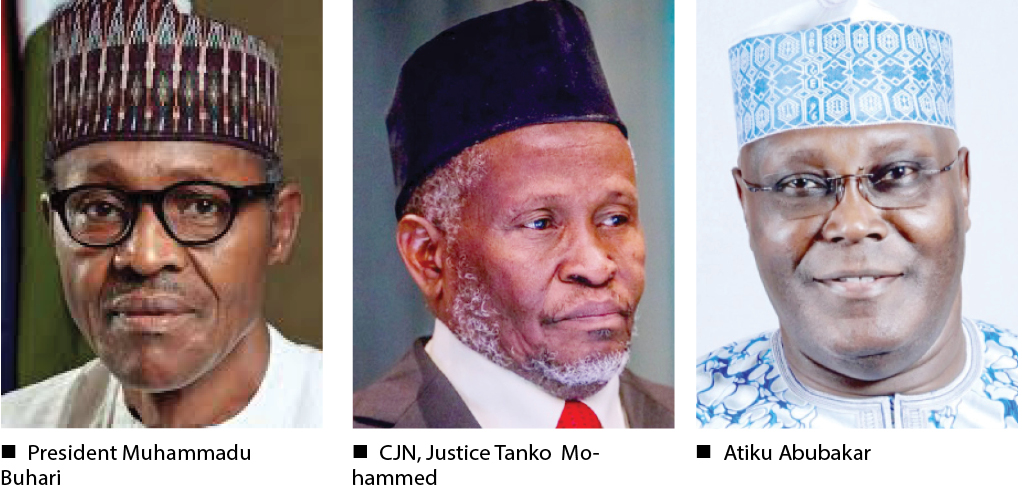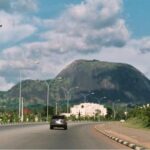The Supreme Court on Friday November 15 gave reasons for dismissing the appeal by the Peoples Democratic Party (PDP) and its candidate, Atiku Abubakar challenging the election of President Muhammadu Buhari in the February 23 presidential election.
Although Atiku and the PDP filed 66 grounds of appeal challenging the verdict of the Presidential Election Petitions Tribunal, which sat in Abuja, they narrowed them to five issues for determination at the Supreme Court.
These issues bordered on academic qualification, false information, majority of lawful votes cast, non-compliance with the law, and wrong admission of Buhari’s documents.
The main judgment, which was the decision of the Chief Justice of Nigeria (CJN), Justice Tanko Muhammad, was read by Justice John Inyang Okoro. Other members of the panel, who agreed with him are: Justices Bode Rhodes-Vivour, Olukayode Ariwoole, Inyang Okoro, Amiru Sanusi, Ejembi Eko and Uwani Abba-Aji.
These five issues and how they were determined by the Supreme Court are presented below:
Academic qualification
Atiku and PDP had claimed that Buhari does not possess the educational qualification to contest the election to the office of the President of Federal Republic of Nigeria as mandated by Section 131(d) of the Nigerian constitution and 31 (1) of the Electoral Act, 2010 (as amended).
But the Supreme Court held that Section 318 of the Nigerian Constitution provides that “education up to secondary school level suffices as qualification without actual possession of the certificate.”
“Also qualified is a person who has been educated up to secondary school certificate level as in sub-paragraph B. in this case, a person need not obtain a certificate; mere attendance in a school up to secondary school certificate level is what is required,” the panel stressed.
The panel further held that a person who possesses a secondary school certificate or Grade 2 Teacher’s Certificate or its equivalent, the City and Guilds Certificate is qualified to contest election into the office of the President of the Federal Republic of Nigeria as contained in sub-paragraph A of Section 318.
“In sub-paragraph C, a person who has a primary 6 certificate or its equivalent and has served in the public or private sector of the federation in any capacity acceptable to the Independent National Electoral Commission, or a minimum of 10 years and has attended a number of courses and trainings in such institutions as may be acceptable to the Independent National Electoral Commission for periods totaling upto a minimium of one year; and ability to read, write, understand and communicate in English language to the satisfaction of the Independent National Electoral Commission and any other qualification acceptable by the Independent National Electoral Commission,” the CJN held.
The justices held that the use of the word ‘or’ instead of ‘and’ in Section 318 is disjunctive rather than conjunctive, “which means each can stand on its own” and declared the Nigerian Constitution as “liberal”.
After admitting the Cambridge, WAEC certificates and group photograph of Katsina Provincial Secondary School tendered by Buhari, the CJN said, “I am satisfied to hold that the court below was right to rely on the certificates to hold that the second respondent (Buhari) was eminently qualified to contest election into the office of the President of the Federal Republic of Nigeria.”
False Information
Atiku and PDP had claimed that Buhari submitted false information to INEC in his Form CF001 accompanied by an affidavit deposed to before an FCT High Court on Nov. 24, 2014 and Oct. 8, 2018 wherein he “claimed that all his academic qualification documents as filled in his Presidential Form, President APC/001/2015 are currently with the Secretary Millitary Board.”
They averred that the military through the Director of Army Public Relations, Brig. Gen. Olajide Olaleye debunked the claim in a press briefing in January, 2015.
But the panel noted that newspaper cuttings and videos of the press conference of Gen. Olaleye was tendered without him being subpoenaed before the court, adding that it is not enough to make such claim, which was of criminal nature, without proof.
‘The position of the law is that he who alleges must prove,” the CJN said.
The apex court also resolved, in favour of Buhari, the claim that the names on his certificates being: ‘Mohamed’ and ‘Muhammadu’ is not same as himself. It explained that “the names belong to the 2nd respondent (Buhari) as nobody has come out to claim those documents.”
Majority of lawful votes cast
The contention of Atiku and PDP was that Buhari and the APC were not duly elected by the majority of lawful votes cast in the election. The appellants claimed that results uploaded on the INEC server showed that they polled 18, 356, 732 votes as against 16, 741, 430 votes to Buhari and the APC.
But the panel ruled that Atiku and PDP failed to prove that the website/ “server” containing the results tendered through the Kenyan ICT expert, David Ayu Njorgu: www.factsdontlie.com belonged to INEC.
The justices dismissed the claim of the existence of the “server” because it had no “ascertainable domain” and was supplied by an anonymous person.
However, Justice Eko observed that INEC’s denial of the existence of a server is “preposterous” based on the provisions of sections 34 and 71 of the Electoral Act, 2010 which mandates it to upload election results to a central server.
The court also dismissed the calculations on forms EC8 series by witnesses presented by Atiku and PDP, saying they were based on hearsay.
Non-compliance with Electoral Act
Atiku and PDP had alleged that the election was conducted in breach of the Electoral Act, 2010 and the Regulations and Guidelines for the Conduct of Elections, 2019 with acts of inflation and deflation of votes, non-authentication of voters’ cards, wrong entries of results and other acts.
But the Supreme Court panel said the law holds the presumption of regularity in an election conducted by the electoral umpire except disproved.
The panel said it is not enough to just file petition but makers of documents relating to allegations of non-compliance must be called to speak to them and be cross examined “If the intention is for the court to act on such document,” adding that otherwise such would have no probative value.
“I am surprised that in a presidential election petition where a petitioner seeks to nullify the election, only five polling agents were called as witnesses,” he said.
The panel noted that PW62 (Osita Chidoka) who was announced as ‘star witness’ admitted in his evidence that he was in the situation room during the election and therefore did not witness what was happening in the field.
Wrong admission of documents
Atiku and PDP had claimed that the tribunal erred in law when it held that President Buhari’s WAEC and Cambridge certificates and other documents (R1 to R26, P85 and P86) were properly admitted in evidence, and that the candidate is not required “to attach his certificates to FORM CF001 before the candidate can be considered or adjudged to have the requisite educational qualifications to contest election.”
But the panel held that President Buhari rightly pleaded facts relevant to the exhibits listed in his INEC form such as certificates and photographs with school mates, charts and other materials that attest to the free and fair conduct of the election.
“If paragraph 41 (a) of the First Schedule of the Electoral Act, 2010 (as amended) requires documents to be either listed or filed before it can be received in evidence, the 2nd respondent properly listed the exhibits submitted to the court below, and so I do not see any reason why the court below would not admit them in evidence,” the CJN said.




